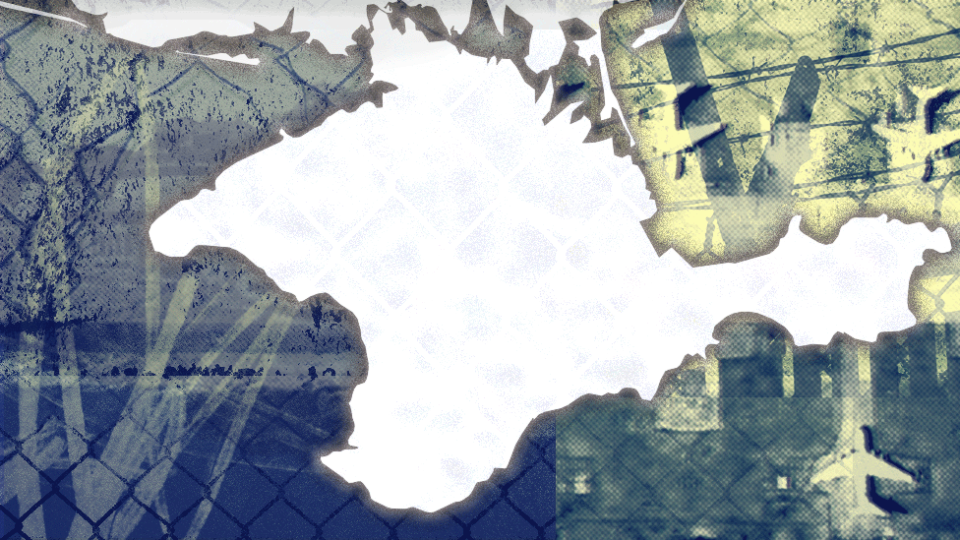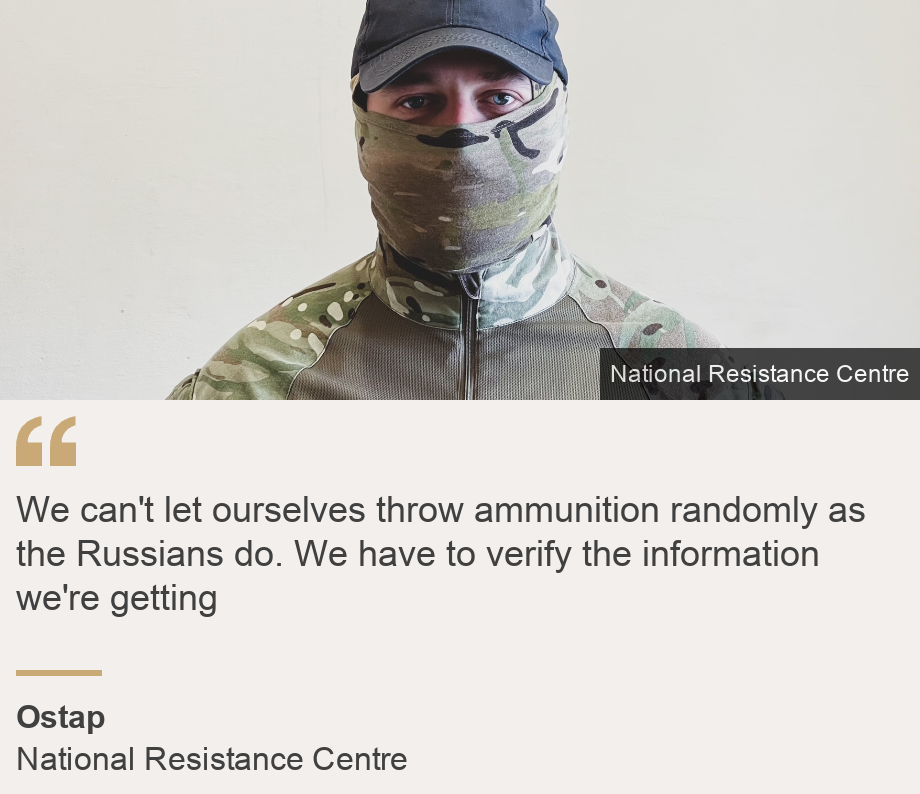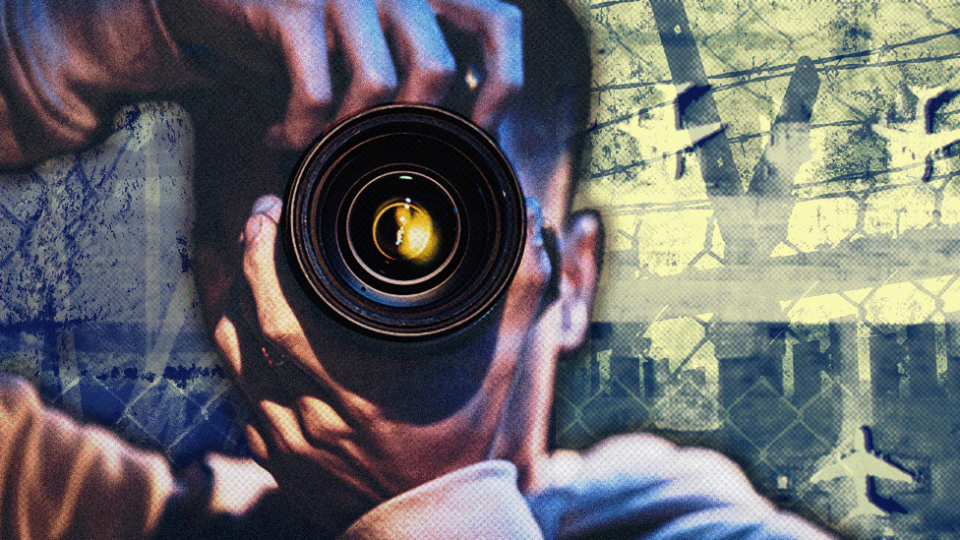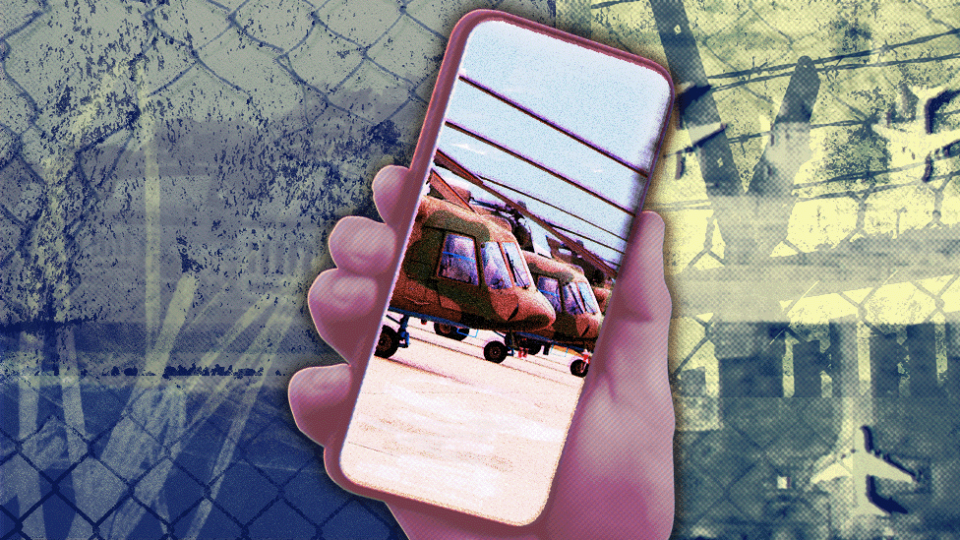“I had a hunch that someone was watching me. My heart was pounding.”
A man, who we’re calling Agent One, takes photos as he crouches down in some bushes.
He tells us he’s part of a group called Atesh – a word that means fire in Crimean Tatar.
And via a messaging app, he describes his secret life to the BBC: spying on Russian forces in occupied Crimea.
“For probably two weeks, I planned in my head how and what I would do,” he says. “Planned the route, the main backup, what I should say in case I was noticed.”
Agent One is thorough. He takes multiple shots from multiple angles.
But it’s dangerous – potentially deadly – work. On one occasion, moments after investigating a site, he noticed a group of Russian servicemen nearby.
“[That] was a terrible moment,” he says. “I managed to lean down [by a] car and pretended that I had a problem with the wheel.”
“Miraculously, they just didn’t talk to me.”

Atesh says it collects information on Russian military movements – mostly in Crimea but also in other occupied areas and even inside Russia itself.
Operatives say their information has aided high-profile Ukrainian strikes on Crimea, such as hits on a Russian landing ship and submarine – the Minsk and Rostov-on-Don – and an attack on the headquarters of Russia’s Black Sea Fleet in September 2023.
Most recently, Atesh said it had carried out reconnaissance work this week after a Ukrainian strike on a possible radar station in Yevpatoria.
Military bloggers in Russia dismiss the network as an online invention of Ukrainian intelligence, designed to overstate levels of resistance.
Yet Russian media also report that Atesh is a terrorist organisation, banned by the Kremlin.
‘Crimeans are not all zombies’
Through messaging apps and a handler for the group, the BBC has spoken with five men who say they’re active agents for Atesh – including one who says he currently works for Russia’s military.
While their accounts cannot be independently verified, a senior source within Ukraine’s defence and intelligences services told the BBC that the testimonies are credible.
The agents say they’re willing to speak to us because they want to show there is an active resistance movement.
“Crimeans are not all zombies and [are] ready to resist even in conditions of total censorship,” Agent One says.
The Russian serviceman who the BBC spoke to – Agent Five – knows his double life is dangerous.
“The stakes are very high – no one wants to go to jail.” Those caught face treason charges and long prison sentences.
“Everything must be approached carefully and with your head. Mistakes in such activities are simply unacceptable.”
Russia annexed the Crimean Peninsula in March 2014, eight years before its full-scale invasion of Ukraine.
Ethnic Russians now make up the majority of the population, but significant Ukrainian and Crimean Tatar minorities remain.

The BBC contacted Atesh directly and spoke to a handler based in unoccupied Ukraine.
The men will not reveal their identities due to the risk of arrest.
“The Russian special services are constantly trying to identify partisans,” Agent Two tells us.
He hides the work he is doing from even his closest family.
‘We can’t throw ammunition randomly’
These men say they started carrying out reconnaissance work because of their opposition to Moscow’s actions.
They tell us they provide intel on air defences, depots, military bases and soldiers’ movements, sometimes staking out sites for weeks.
Agent Two says he’s not paid for his work, but he is refunded for his expenses, like fuel.
Our main contact, the handler, would not comment on how the group is funded except to say there are “several” sources of income.
A different body – the National Resistance Centre, which operates under Ukraine’s Special Operation Forces – is openly funded by the government and works with Atesh.
It insists Atesh is not a propaganda construct and that the intel is of high value.
“A missile attack with Storm Shadow or Himars is a very expensive thing,” says its spokesman, who wears a mask and goes under the pseudonym of “Ostap”.
“We can’t let ourselves throw ammunition randomly as the Russians do. We have to verify the information we’re getting.”

Agent Two describes driving more than 100km (62 miles) to survey a military site. He walked “for a long time”, before managing to find a gap in a fence.
He squeezed through it, to gather photos and information on military vehicles.
“It’s exciting,” he says. “Adrenaline rises incredibly powerfully at such moments.”
In the days that followed, he heard there had been a successful strike in that area.
“This is the moment I am most proud of,” he says.
Forcing Russia from the Black Sea
Huge attacks on Russian military targets in Crimea are seen by Kyiv as a key part of a counter-offensive that has faltered elsewhere, notably on the frontlines.
The peninsula is of high strategic importance as it is essentially an “unsinkable aircraft carrier”, says retired Ukrainian Navy Captain Andriy Ryzhenko.
Based in Crimea before the annexation and now in Kyiv, he says the peninsula is used by Russia to “project power” from the Black Sea towards the Mediterranean and Atlantic.
It has forced Ukraine to create a new sea route for grain ships to steer clear of the peninsula, after Russia pulled out of a deal to allow shipments.
Yet satellite imagery indicates Ukrainian strikes have caused Russia to move assets away from occupied Sevastopol and to the Russian port of Novorossiysk.
For Atesh, the threat of infiltration by pro-Russian operatives is very real, in a murky world of agents and double agents.

“We try not to disclose strategic plans to the agents who are at risk of being taken by the FSB,” says our handler, in reference to Russia’s Federal Security Service.
“A person knows only what he needs to know.”
A third agent tells us that “filming the military of a country that is at war is suicide”, but the risk is justified because of Russia’s “criminal war”.
“If I am caught, then I will face the basements of the FSB and [accusations of being] a ‘traitor’ to the Motherland.”
But, with the risk, comes the possibility too of reward.
“We often see the fruits of our work,” says Agent Four. “When… Russian military [sites] are hit, so that only ashes remain.”
Sometimes it’s just a quick photo or two. Sometimes Agent Four observes areas over a prolonged period.
“To find out all the routes of patrols, find out where all the exits and entrances are, what equipment is on the territory, or what exactly is stored at the facility.”

Each man tells us he works alone, contacting only a “curator” to whom the information is passed.
Atesh appeared as a network after Russia’s full-scale invasion in 2022 and is by no means the only resistance organisation in occupied areas.
It claims to be a grassroots movement that’s grown from a small group which now numbers “thousands”.
An “oath” posted on the Telegram messaging app in September 2022 said, “I swear by my blood and my soul” to be faithful to the Atesh movement and “fight for the Ukrainian state”.
There are reported to be strong links to the peninsula’s Turkic-speaking Crimean Tatar population – although representatives of that community who the BBC spoke to said they did not start Atesh.
The group regularly posts about its work on Telegram, even uploading photos.
While the movement mainly appears to provide logistical information, partisan activists also claim to have carried out violent attacks – such as killing 30 Russian soldiers in a military hospital and a car-bomb attack in Russian-occupied Kherson.
The handler we speak to concedes that they are keen to publicise the group – to recruit more agents and unnerve the Russians.
But all those the BBC spoke to say their priority is ending Russia’s invasion and its occupation of Ukrainian land.
Agent One says that, in Crimea, they live in “terrible conditions” of propaganda and control.
“But I am absolutely sure that we are gradually bringing our liberation of Crimea closer.”
Additional reporting by Anastasiia Levchenko and Hanna Chornous


